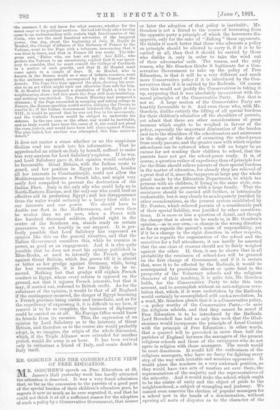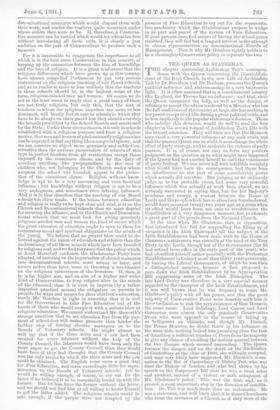GOSCHEN AND THE CONSERVATIVE VIEW OF FREE EDUCATION.
R. GOSCHEN'S speech on Free Education at St. James's Hall yesterday week has hardly attracted the attention it deserved. It was a very frank admission that, so far as the concession to the parents of a good part of the special burden of their children's education goes, he regrets it now as much as he ever regretted it, and that he could not think it at all a sufficient reason for the adoption of such a policy by a Conservative Government, that sooner or later the adoption of that policy is inevitable. Mr. Goschen is not a friend to the course of borrowing from the opposite party a principle of which the borrowers dis- approve, only for the sake of " dishing " those opponents. He thinks it much better that those who advocate a policy on principle should be allowed to carry it, if it is to be carried at all, than that it should be carried by those who dislike it, only in order to take the wind out of their adversaries' sails. The reason, and the only reason, why Mr. Goschen thinks it legitimate for a Con- Bervative Government to take . up the policy of Free Education, is that it will be a very different and much more Conservative policy if it is introduced by the Con- servatives than if it is carried by the Radicals. Of course even this would not justify the Conservatives in taking it up, supposing that it was absolutely inconsistent with the moral principles of the Conservative Party. But that is not so. A large section of the Conservative Party are heartily favourable to it. And even those who, with Mr. Goschen, dislike entirely the lifting of all special burdens for their children's education off the shoulders of parents, yet admit that there are other considerations of great moment which ought to be weighed in favour of the policy, especially the important diminution of the burden cast onto the shoulders of the schoolmasters and mistresses in the shape of the duty of extracting the school-pence from needy parents; and the greater ease with which regular attendance can be enforced when it will no longer be an excuse for not sending their children to school, that the parents have not got the school-pence ready. It is, of course, a question rather of expediency than of principle how ,far the State should relieve parents of their special burdens in the mat ter of education, for already theyare relieved of a great deal of it, since the taxpayers at large pay the whole grant made by the Education Department, to which tax persons with no children, if living in the same style, con- tribute as much as persons with a large family. That the assistance should be carried still further, is intrinsically undesirable, but it may clearly be as adequately justified by other considerations, as the present system established by Mr. Forster, which relieved parents of a considerable part of their special liability, was justified by other considera- tions. It is more or less a question of detail, and though the change that is about to be made is, in Mr. Goschen's opinion,—as in our own,—a change in the wrong direction so far as regards the parent's sense of responsibility, yet if it be a change in the right direction in other respects, so far as regards the organisation of the school and the securities for a full attendance, it can hardly be asserted that the one class of reasons should not be fairly weighed against the other. If, then, it can be shown that in all probability the remission of school-fees will be granted on the first change of Government, and if it is certain that, were it to be effected by the Radicals, it would be accompanied by provisions almost or quite fatal to the prosperity of the Voluntary schools and the religious character of their teaching, it is quite fair, Mr. Gosehen holds, for the Conservative Party to take this into account, and to accomplish without an anti-religious revo- lution that, which, if it were undertaken by the Radicals, would certainly be accomplished with such a revolution. In a word, Mr. Goschen pleads that it is a Conservative policy, —a policy worthy of the Conservative Party,—to save the religious schools, and that they cannot be saved if Free Education is to be introduced by the Radicals. Lord Herschell has told us only this week that the Glad- stoniaus would incorporate the principle of Local Control with the principle of Free Education ; in other words, that a quarrel will be provoked in more than half the parishes of England between the managers of tho present religious schools and those of the ratepayers who do not agree in religion with those managers. The result would be most disastrous. It would kill the enthusiasm of the religious managers, who have no fancy for fighting every step of the way with irritable and sensitive opponents. It would place the teachers in a very awkward position, as they would have two sets of masters set over them, the representatives of the majority and the representatives of the minority. And it would make the school, which ought to be the centre of unity and the object of pride to the neighbourhood, a subject of wrangling and jealousy. We cannot even conceive the election of popular managers for a school now in the hands of a denomination, without opening all sorts of disputes as to the character of the denominational managers which would disgust them with their work, and render the teachers quite uncertain under whose orders they were to be. If, therefore, a Conserva- tive measure can be carried which would set education free without introducing all these evils, it is clearly a just ambition on the part of Conservatives to produce such a measure.
For it is impossible to exaggerate the importance to all which is in the best sense Conservative in this country, of keeping up the connection between the love of knowledge and the love of religion. It is a great misfortune that the religious differences which have grown up in this country have almost compelled Parliament to put very serious restrictions on the religious teaching of our Board schools, and so to render it more or less unlikely that the teachers in these schools should be, in the highest sense of the term, religious-minded men and women. Of course we do not in the least mean to imply that a great many of them are not truly religious, but only this, that the sort of teachers in whom the religious impulses are more or less dominant, will hardly feel at ease in schools in which they have to be always on their guard lest they should overstep the bounds prescribed by the School Boards and sanctioned by the State. Under these circumstances, it is only in schools established with a religious purpose and from a religious motive, that men and women of predominantly religious aims can be expected to find anything like a congenial sphere ; and we can conceive no object more genuinely and nobly Con- servative than the anxious preservation of schools of this type in perfect freedom from all restrictions except those imposed by the conscience clause, and by the duty of avoiding anything like propagandism in the ease of children who, not belonging to the Church under whose auspices the school was founded, appeal to the protec- tion of the conscience clause. Religion without know- ledge is apt to be a very narrowing and even fanatical influence.; but knowledge without religion is apt to be a very ambiguous, and sometimes even relaxing influence. And it is in that direction that the teaching of our Board schools too often tends. If the union between education and religion is really to be kept close and vital, it is on the Church and Denominational schools that we must depend for securing the alliance, and to the Church and Denomina- tional schools that we must look for giving genuinely religious-minded men and women the kind of career which the great extension of education ought to open to them for impressing moral and spiritual obligations on the minds of the young. We believe that no greater blow could be de- livered against the union of education and religion than the undermining of all those schools which have been founded by religious zeal, and we feel very sure that the policy which, as Lord Herschel' confesses, the Gladstonia,n Party have adopted, of insisting on the importation of elected managers into denominational schools, must sooner or later, and sooner rather than later, issue in throwing a wet-blanket on the religious earnestness of the founders. If, then, it be a far higher aim, and an aim of a higher and wider kind of Conservatism, to keep religion alive in the minds of the educated, than it is even to impress (by a rather imperfect practical means) the obligation on parents to provide the ways and means for their children's education, surely Mr. G °schen is right in asserting that it is well for the Goverement to take Free Education out of the hands of those who would couple it with a serious blow at religious education. We cannot understand Mr. Howorth's strange assertion that to set education free from the pay- ment of school-fees will rather promote than hinder the further step of forcing elective managers on to the Boards of Voluntary schools. He might almost as well say that if the three acres and a cow had been secured for every labourer without the help of the County Council, the labourers would have been only the more eager to get the County Council than they would have been if they had thought that the County Council was the only means by which the three acres and the cow could be obtained. The English voter cares a good deal for Free Education, and cares exceedingly little for repre- sentation on the Boards of Voluntary schools ; yet he would be willing enough, of course, to cry out for the i latter f he believed it to be inseparably bound up with the former. But let him have the former without the latter, and we should not find him at all willing to bestir himself to get the latter added. The religious schools would be safe enough, if the people ',Mere not tempted by the promise of Free Education to cry out for the representa- tive machinery which the Gladstonians propose to wedge in as part and parcel of the system of Free Education. If poor parents once feel secure of having the school-pence remitted, they will feel but a languid interest in the attempt to obtain representatives on denominational Boards of Management. That is why Mr. Goschen rightly holds it to be a thoroughly Conservative policy to separate the two.







































 Previous page
Previous page